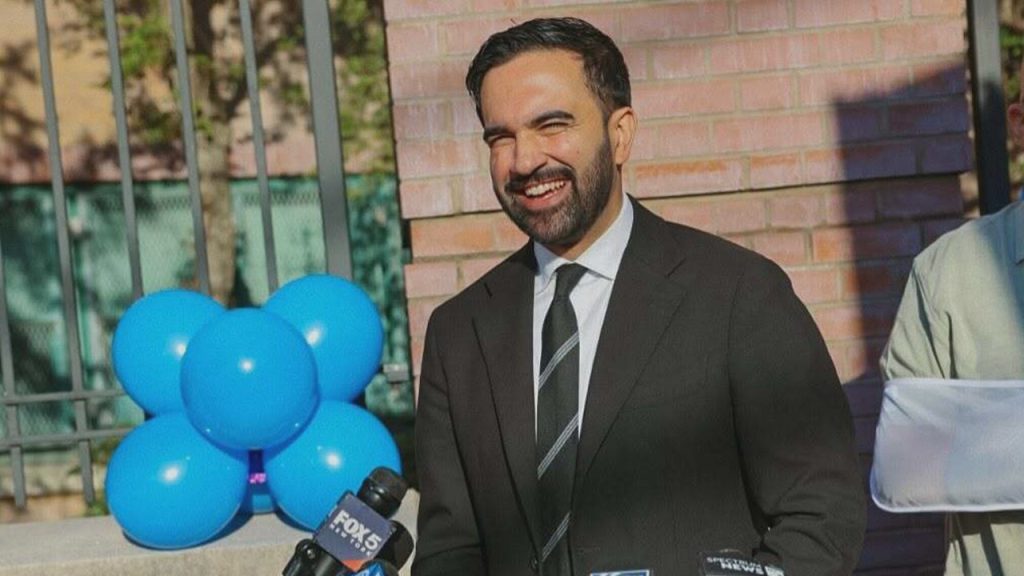From Social Media Critic to Campaign Controversy: Mamdani’s Mixed Message
New York City mayoral candidate Zohran Mamdani finds himself in an uncomfortable spotlight after appearing to contradict his own stance on children and social media. The 33-year-old politician, who has cultivated significant online presence through viral content, recently faced criticism for featuring interviews with young children in his campaign advertisements – shortly after expressing gratitude that his own childhood predated the social media era. This apparent contradiction has raised eyebrows among followers and critics alike, particularly as New York implements a statewide classroom cellphone ban aimed at protecting student mental health.
The controversy began when Mamdani appeared outside I.S. 5 in Queens on the first day of school, publicly supporting the new cellphone restrictions. In an Instagram post accompanying this appearance, he reflected on his own upbringing, writing: “I consider myself fortunate—when I was a student, it was before social media had cannibalized the way that kids interact with one another.” This thoughtful statement resonated with many parents and educators concerned about social media’s impact on childhood development. However, the messaging became complicated when, just days later, Mamdani’s campaign accounts featured videos of two young children speaking directly to him and Senator Elizabeth Warren. One clip showed a girl confidently endorsing him, while another featured a boy offering support with Warren nearby – precisely the kind of childhood social media exposure Mamdani had seemingly criticized.
The apparent disconnect between Mamdani’s words and actions prompted immediate reactions from his social media followers. “Why are you using kids to promote your political agenda?” asked one commenter, while another noted the girl’s young age while commenting on her articulateness. The criticism centered on a perceived ethical inconsistency – if social media has “cannibalized” childhood interactions, as Mamdani suggested, then featuring children in political campaign content on those same platforms seems problematic. This backlash came amid growing conversations about protecting children’s privacy and mental wellbeing in digital spaces, with some viewers suggesting that children should be kept separate from political campaigning altogether, regardless of which candidate they might be supporting.
The timing of this controversy is particularly noteworthy, as it coincided with New York Governor Kathy Hochul’s defense of the new statewide cellphone restrictions in schools. Appearing on “Fox News Sunday,” Hochul argued that limiting smartphone and smartwatch use during school hours would reduce distractions, improve student mental health, and even enhance safety by preventing location-sharing during emergencies. The new policy allows exceptions only for medical or educational purposes, reflecting growing concerns about technology’s impact on developing minds. For Mamdani to publicly support these restrictions while simultaneously leveraging children’s images for his digital campaign creates what critics see as a jarring contradiction that undermines his credibility on the issue.
Mamdani’s path to becoming a mayoral candidate has been marked by progressive politics and digital savvy. After unseating a longtime incumbent in the Democratic primary, he has campaigned on ambitious promises including a $30 minimum wage and a rent freeze. His endorsement from former New York City Mayor Bill de Blasio and Senator Elizabeth Warren highlights his position within the progressive wing of the Democratic Party. However, this latest controversy underscores the challenges politicians face in maintaining consistent messaging across different contexts – especially when navigating sensitive issues involving children, technology, and social media. As candidates increasingly rely on digital platforms to connect with voters, the ethical boundaries around featuring minors in political content remain contested terrain.
As the New York City mayoral election approaches, Mamdani’s campaign has yet to publicly address the criticism over featuring children in his social media advertisements. Fox News Digital reported reaching out to Mamdani for comment, but no response was mentioned in their coverage. The incident raises broader questions about political campaigning in the digital age: How can candidates effectively engage with voters online while respecting the very concerns they raise about social media’s impact? When politicians speak about protecting children from excessive technology exposure, do they have a special responsibility to model those values in their own digital practices? For voters concerned about both progressive policies and digital ethics, Mamdani’s handling of this controversy may become a significant factor in their assessment of his candidacy and commitment to his stated values.


